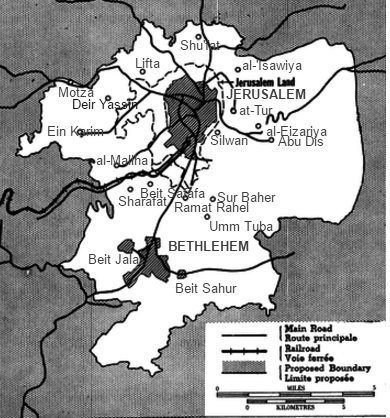Pages in Section 13

The Internal Battle for Jerusalem
ii. Massacres at refinery and Balad al Sheikh
iii. Battle for Jerusalem 1
iv. Ben Yehuda Street bombed
v. Jewish Agency bombed
vi. A traffic policeman reminisces
vii. Battle for the Roads 1 - Jerusalem
viii. Battle for the Roads 2 - Mishmar ha Emek
ix. Battle for the Roads 3- Deir Yassin
x. Haddassa Hospital Convoy
xi. Battle of the Roads 4- Gush Etzion
 There should have been no battle for Jerusalem. The UN had proclaimed Jerusalem an international city and had planned for a period when Britain would gradually hand-over to a peace-keeping UN Force while evacuating British troops and police to holding centres in in Haifa and Jenin
There should have been no battle for Jerusalem. The UN had proclaimed Jerusalem an international city and had planned for a period when Britain would gradually hand-over to a peace-keeping UN Force while evacuating British troops and police to holding centres in in Haifa and Jenin
However, since no UN peace-keeping troops were available during the British evacuation, Britain was unable to guarantee the safety of UN officials in Palestine. As a result no hand-over took place. The result was chaos.
Britain had surrounded Jewish, Arab and British aministrative areas at the beginning of 1947 with barbed wire and checkpoints at every entrance. Passes, authorized by the Palestine Police, were needed to travel from one zone to another. Everyone, even the police patrols had to show them. For the most part, residents of Jerusalem kept out of the fighting. The proportion of anti-Zionist Jews in Jerusalem was higher than in any other area of Palestine while urban Arabs were less likely to take up arms than those living in the country.
Fierce fighting, however, broke out n the mixed unzoned areas between Jewish underground frces brought in from rural settlements and the Arab Holy War Army, as each side tried to seize the other's territory and protect their co-nationals. The Jewish Agency even established a cold call centre advising Arab civilians to evacuate their homes before they were blown up while, at the same time, pressurizing Jewish residents to remain in their homes despite dangers and discomfort. The Jewish leadership knew the side that remained in their houses would win the battle for Jerusalem. However, all that prevented most Jewish residents of the old city from surrendering to the Holy Arab Army during the last days of the British Mandate was the knowledge that the untrained Arab irregulars might kill them anyway so it would be safer to hold out until the more disciplined Jordanian troops marched in after the British left.
Armed foot police patrolled the old city in pairs but that didn't prevent them from being shot down by Arab snipers on roof tops for the sake of their weapons.Outside the walls, British Police in parol cars were shot by Jewish snipers as they left their vehicle to invstigate an incident, again for the sake of the weapons they carried.
Most private vehicles were laid up in secure garages as petrol was almost unavailable, even doctors who were given priority had to queue up for hours. Despite this, the police had a problem with the theft of public vehicles. Arab and Jewish militant groups stole police armoured cars, ambulances and post office vans. The Post and Telegraph service went so far as to shut down all postal deliveries until their vans were returned. The Palestinian Broadcasting Service issued a daily list of stolen vehicles so soldiers and police on checkpoint duty could identify vehicles that militants could be using for terrorist attacks. Meanwhile Aras outside Jerusalem were ambushing Jewish convoys bring food to Jewish shops.
Meanwhile the British authorities were gradually withdrawing the British Palestine police to evacuation centres leaving only a skeleton force in Jerusalem to protect Bevingrad and key buildings and services such as Barclay's Bank and the No 22 bus service to the Jewish quarter of the old city.
By March, the situation had grown so bad that Haganah had to put the first stages of their plan Dalet into action. They had not intended to activate this plan until after the British had left.
( See Battle of the Roads -Jerusalem. )